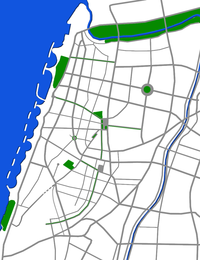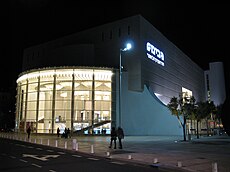Habimah
|
|
Habimah ( Hebrew הַבִּימָה ha-Bīmah , German for 'the stage' ) is the Israeli national theater in Tel Aviv .
history
Russia
In 1912 Nachum Zemach founded the Habima Theater in Białystok (Russian: театр "Габима" / teatr "Gabima" ). It had to close again after a short time. In 1916 he was able to reopen it in Moscow . According to other sources, the Habimah Theater was founded in Moscow in 1918, after the October Revolution, by Menachem Gnessin , Nachum Zemach and Hanna Rubin-Rovina under the auspices of the Moscow Art Theater (MChAT). Yevgeny B. Wachtangow became artistic director at the suggestion of Konstantin S. Stanislawski . The venue was the art theater .
The theater played plays by David Pinski , Salomon An-ski , Scholem Alejchem and others in the Hebrew language . It gained an international reputation on tours to Warsaw , Berlin , London and New York with the plays The Ewige Jude, The Dibbuk and The Golem , less because of the Jewish themes of the plays than because of the stylistic inventiveness of these three productions and theirs special artistic engagement with Russian modernism and with German expressionism. Hebrew was sometimes criticized, in which some pieces were performed, which was still a purely artificial language and only had to develop its own literary style in accordance with the emerging Hebrew colloquial language in Palestine.
tour
In 1926 the theater company left the Soviet Union and toured Poland, Germany, Austria, France and the USA with a great response.
On November 19, 1930 Otto Hellmuth initiated a protest rally against the planned performance of the play “Dybuk” by Salomon An-ski by “Habima” in the Würzburg City Theater . Only through massive police operations could the anti-Semitically motivated disturbances by chants from several hundred protesters and the violent entry into the theater be prevented and the evening performance secured. The predominantly Jewish theatergoers, including the non-Jewish Lord Mayor of Würzburg Hans Löffler , were not spared from running the gauntlet through a fanatical crowd before the performance. After the performance, the visitors were again harassed by the mob and several people were injured. In February 1931, NSDAP supporters convicted by the Würzburg lay judge were given mitigating circumstances because the motive of the accused was "not dishonorable".
Palestine, Israel
In 1928 part of the ensemble went to Palestine. 1931–1932 it came to Tel Aviv. During the British mandate , around 80% of the plays were performed in Yiddish , German, English and Russian; after the state was founded, Hebrew prevailed. In 1958 the Israeli government decided to rename the Habima Theater the “Habima National Theater”. a. to enable state subsidies for the theater.
present
The theater has hired 80 actors ; another 120 people are employed at Habimah. Ja'akov Agmon has been General Manager since 2003 .
The theater planned to perform in Kirjat Arba , an Israeli settlement in the occupied West Bank near Hebron , in November 2016 . A performance in the Israeli settlement of Ariel , also in the occupied West Bank, was already on the program in March 2016 . Israeli artists and academics protested the plan, and the daily Ha'aretz condemned the decision in an editorial. Michel Warschawski wrote in it that the planned performances are another argument for a cultural boycott of Israel. The theater responded to the protests as follows: “The theater management is indignant and rejects calls to exclude certain citizens and certain cities, and condemns any attempt at cultural boycotts against places where Israeli citizens live. The Habimah Theater is the national theater of the State of Israel. ”Minister of Culture and Sports Miri Regev said:“ The decision to appear in Hebron for the first time is exemplary of the pioneering role of the national theater . ... I support Habimah for his clear position against the wave of criticism from the left ... "
Award
In 1958, the Habimah received the Israel Prize for theater , the highest award of the State of Israel .
The building
From 1933 the theater building was built in the center of Tel Aviv by the Hungarian - Jewish architect Oskar Kaufmann, who was successful in Germany with theater buildings. The theater ensemble used the unfinished building from 1945. The square south in front of the building was named after the Kikkar ha-Bimah ( Hebrew כִּכָּר הַבִּימָה 'Habimah Square' ).
renovation
The Israeli architect Ram Karmi was commissioned in 2007 to rebuild the historic building from the 1930s / 1940s. In January 2012 the theater reopened after a four and a half year renovation period. The construction costs amounted to more than 100 million shekels (approx. 21 million euros). The building was expanded by more than 500 m² . All four theaters have been completely redesigned. The architect Ram Karmi, known as a representative of the modern architectural style Brutalism , was criticized for the massive construction.
literature
- Shelly Zer-Zion: Habima. In: Dan Diner (Ed.): Encyclopedia of Jewish History and Culture (EJGK). Volume 2: Co-Ha . Metzler, Stuttgart / Weimar 2012, ISBN 978-3-476-02502-9 , pp. 494–498.
Individual evidence
- ↑ In the absence of the voiceless glottal fricative h in Russian, the Cyrillic 'Г', i.e. 'G', was used when transcribing foreign language terms and names. Hence the Russian sound of numerous names such as Gabima, Gamburg (Hamburg) or Kogan (Cohen). Today h is usually represented with the Cyrillic 'Х' [χ] .
- ↑ a b Gad Kaynar: National Theater as Colonized Theater. The Paradox of Habima . In: Theater Journal , 50.1, March 1998, pp. 1–20, here p. 2.
- ^ Roland Flade: The Würzburg Jews from 1919 to the present . In: Ulrich Wagner (Ed.): History of the City of Würzburg , 4 volumes. Theiss, Stuttgart 2001–2007, Volume III / 1–2: From the transition to Bavaria to the 21st century . 2007, ISBN 978-3-8062-1478-9 , pp. 529-545 and 1308, here: p. 534.
- ↑ Angelika Timm, Johannes Glasneck: Israel - History of the State since its foundation . 3. Edition. Bouvier Verlag, Bonn 1998, ISBN 3-416-02753-1 , p. 258 .
- ↑ Ha'aretz- Editorial: Israel's National Puppet Theater Heads to Settlements , in: Ha'aretz , October 26, 2016; Michel Warschawski : Habima Theater and the need for a cultural boycott of Israel ( Memento of the original from October 31, 2016 in the Internet Archive ) Info: The archive link was inserted automatically and has not yet been checked. Please check the original and archive link according to the instructions and then remove this notice. Alternative Information Center , October 30, 2016.
- ↑ Yarír Ashkenazi: Israeli Artists, Academics Protest National Theater Performance in West Bank , in: Ha'aretz , October 25, 2016.
- ↑ Ha'aretz- Editorial: Israel's National Puppet Theater Heads to Settlements , in: Ha'aretz , October 26, 2016; Ran Boker: Habima to travel to Kiryat Arba, fans protest . ynetnews.com , October 24, 2016; Michel Warschawski : Habima Theater and the need for a cultural boycott of Israel ( Memento of the original from October 31, 2016 in the Internet Archive ) Info: The archive link was inserted automatically and has not yet been checked. Please check the original and archive link according to the instructions and then remove this notice. Alternative Information Center , October 30, 2016; Misha Shulman: Israel's national theater must resist normalizing occupation +972 , October 28, 2016.
- ^ Heinz Politzer: Habimah in New York: A Great Theater Enters a New Period . ( Page no longer available , search in web archives ) Info: The link was automatically marked as defective. Please check the link according to the instructions and then remove this notice. In: Commentary Magazine , August 1948 (English). Retrieved August 27, 2014.
- ↑ Zippi Shochat: A new stage for Habima . In: Ha'aretz (English)
- ^ Curtain rises over Tel Aviv's newly renovated Habima Theater . In: Ha'aretz (English)
- ↑ Habima architect tells critics: 'Kiss my ass' . In: Ha'aretz (English)
Web links
- Official Site (Hebrew)
- Moscow theater "Habimah"
- Habimah . In: jewishvirtuallibrary (English)
Coordinates: 32 ° 4 ′ 21.8 ″ N , 34 ° 46 ′ 44.2 ″ E








